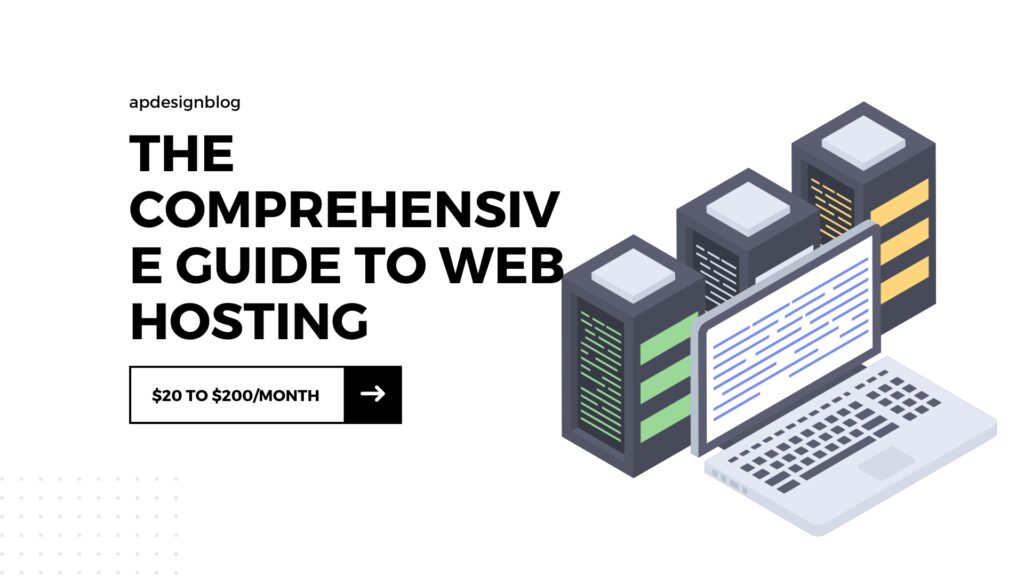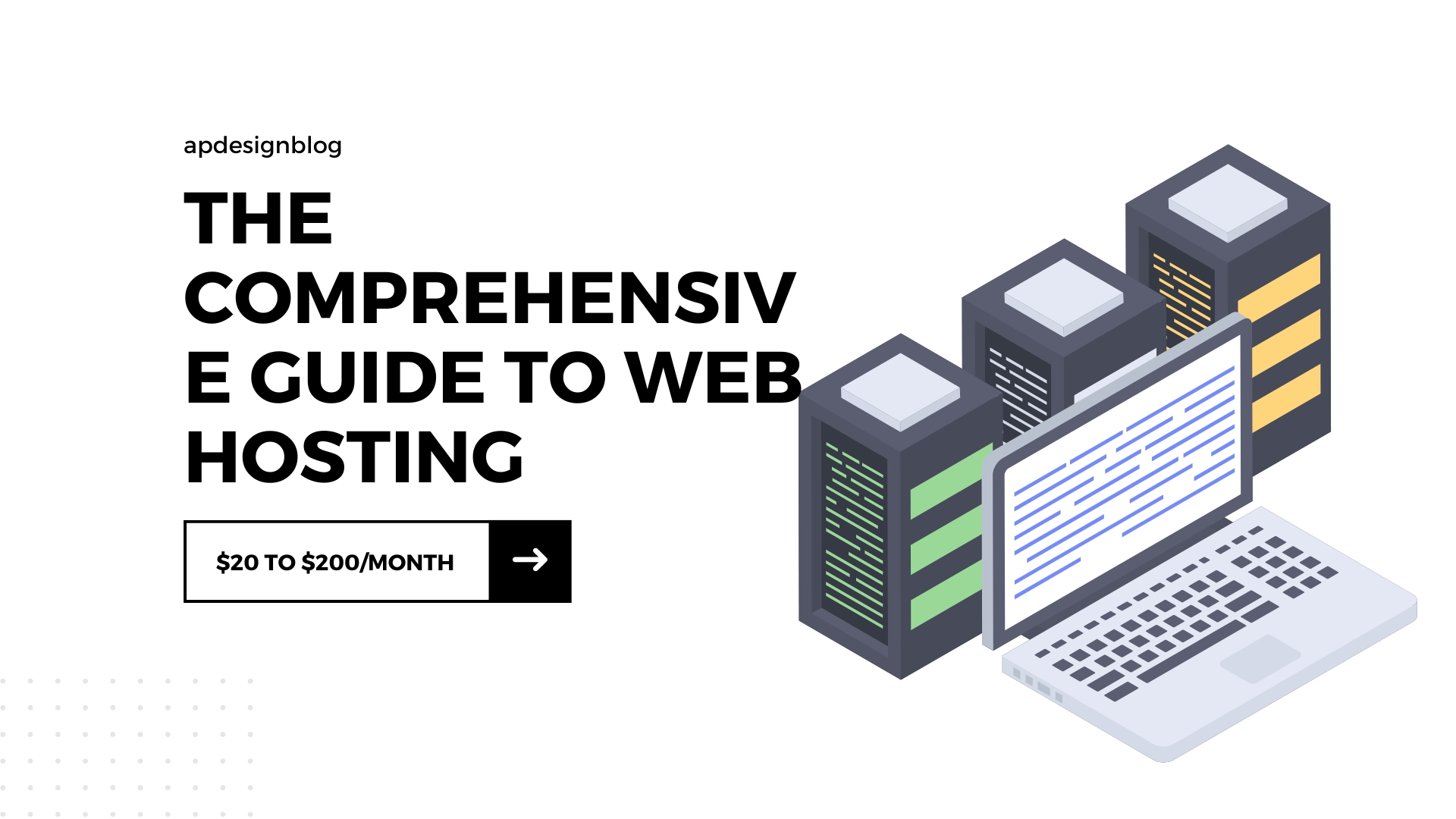Web hosting is an essential element of any digital presence. Selecting an appropriate web hosting service is crucial for the performance speed and stability of your site whether you are initiating a personal blog an e-commerce platform or a company website. This comprehensive guide will elucidate the concept of web hosting the various types accessible and the criteria for selecting the most suitable choice for your requirements.

1. Definition of Web Hosting
Web hosting is a service that enables individuals and businesses to render their websites available on the Internet. Acquiring a hosting package entails leasing space on a server for the storage of your website’s files. The hosting company is accountable for server maintenance assuring uptime and offering numerous options to help your website.
Essential Elements of Web Hosting:
Server: The tangible device that houses your website’s data.
Domain Name: The URL that users enter in their browser to reach your website (e.g. www.example.com).
Bandwidth: The volume of data that can be transmitted between your website and its users.
Storage: The capacity allocated for the retention of your website’s files photos and databases.
2. Categories of Web Hosting
Various forms of web hosting exist each addressing distinct requirements and financial constraints. Below is an analysis of the most prevalent alternatives:
A. Shared Hosting
Optimal For Novices small scale websites blogs and personal endeavors
Pricing: Commencing at $2 and extending to $10 each month
Summary:
Shared hosting is the most economical choice where in numerous websites utilize the same server resources (CPU RAM storage). This maintains minimal expenses but may impact performance if a single site on the server encounters an elevated load.
Advantages:
Cost-effective pricing Simple to configure and utilize Administered by the hosting provider (no technical expertise required)
Disadvantages: Restricted resources and diminished performance Reduced control over server configurations Security vulnerabilities stemming from shared server usage with other websites
Suggested Providers:
B. VPS Hosting (Virtual Private Server) Optimal For:
Expanding websites for small enterprises and users requiring enhanced control
Cost: Ranging from $20 to $60 monthly
Summary:
VPS hosting provides an intermediary solution between shared and dedicated hosting. It uses virtualization technologies to establish a virtual environment on a physical server. Every VPS possesses dedicated resources providing superior performance and control compared to shared hosting.
Advantages:
Allocated resources for enhanced performance Increased control over server configuration Scalable by website growth
Disadvantages: Elevated expense compared to shared hosting necessitates a certain level of technical expertise. It may still be impacted by problems on the actual server.
Suggested Providers:
- DigitalOcean
- Linode
- InMotion Hosting
C. Dedicated Hosting
Optimal For Extensive websites high traffic enterprises and individuals need complete control
Pricing: Commencing at $80 and exceeding $500 per month
Summary:
Dedicated hosting entails leasing an entire physical server solely for your website. This configuration offers optimal control security and performance albeit at an elevated expense.
Advantages:
Complete authority over server configurations Enhanced performance with allocated resources
Improved security
Disadvantages: Costly
Necessitates technical proficiency for management Maintenance and server administration can be labor-intensive
Suggested Providers:
D. Cloud Hosting
Optimal For Websites requiring scalability reliability and flexibility
Pricing: Pay as you go commencing at $10 and beyond $150 each month
Summary:
Cloud hosting employs a network of interlinked servers to host websites. Your site’s data is scattered among numerous servers rather than dependent on a single server, guaranteeing high availability and scalability.
Advantages:
Highly scalable according to traffic requirements Exceptional uptime and dependability Payment solely for utilized resources
Disadvantages: Can incur significant expenses with extensive usage Complicated to configure and oversee Reduced control over server configurations
Suggested Providers:
E. Managed WordPress Hosting
Optimal For WordPress blogs bloggers and individuals without technical expertise
Pricing: Commencing at $15 and extending to $50 each month
Summary:
Managed WordPress hosting is explicitly tailored for WordPress websites. The hosting company manages all technological elements including upgrades security and backups rendering it an ideal option for individuals seeking a seamless experience.
Advantages:
Enhanced WordPress efficiency
Automated updates and backups
Improved security functionalities
Disadvantages: Higher cost compared to conventional shared hosting Exclusively for WordPress sites Reduced flexibility for bespoke settings
Suggested Providers:
Read also – A Comprehensive Guide to Using LinkedIn to Attract Clients
3. Essential Attributes to Consider in a Web Hosting Provider
When selecting a web hosting service evaluate the subsequent attributes:
A. Availability Assurance
An optimal hosting company must provide an uptime guarantee of no less than 99.9%. Uptime denotes the duration during which your website is operational and available to users. Regular downtimes can adversely affect your SEO and user experience.
B. Velocity and Efficiency
The velocity of a website is essential for user experience and search engine optimization. Seek suppliers that deliver rapid servers SSD storage and integrated caching capabilities. Content Delivery Networks (CDNs) such as Cloudflare can enhance website speed.
C. Client Assistance
Dependable customer service is crucial, particularly for those lacking technological expertise. Seek companies who offer round-the-clock help through live chat telephone and email.
D. Security Attributes
Security is essential to safeguard your website against risks such as hacking and viruses. Essential features to consider encompass SSL certificates daily backups firewalls and DDoS mitigation.
E. Scalability
Select a hosting plan that can accommodate the growth of your website. This may necessitate an upgrade to a VPS or cloud hosting if your traffic escalates.
F. Control Interface
An intuitive control panel such as cPanel or Plesk can facilitate website administration encompassing the configuration of email accounts file management and application installation.
4. Selecting the Appropriate Web Hosting for Your Requirements
Step 1: Ascertain Your Website Objective Personal Blog or Minor Website: Shared hosting is typically adequate.
E-commerce or High Traffic Site: Opt for VPS dedicated or cloud hosting to enhance performance.
WordPress Site: Managed WordPress hosting provides ease of use and enhanced performance.
Step 2: Assess Your Financial Plan Establish a budget and evaluate pricing structures. Consider the possible necessity for upgrades as your website expands.
Step 3: Assess Reviews and Reputation Examine customer reviews and consult forums for impartial assessments of hosting services” dependability and customer service.
Step 4: Evaluate the Provider’s Attributes Create a checklist of essential features including SSL backups security measures and scalability choices.
Step 5: Evaluate Customer Support Contact the provider’s support team with pre-sales inquiries to assess their response and efficacy.
Read also – A Detailed Guide to Virtual Assistant Services: What They Are How to Start and How to Succeed
5. Suggested Web Hosting Providers for 2024
Best Overall: Bluehost is Ideal for novices and provides outstanding customer assistance.
Optimal for Performance: SiteGround is Renowned for its speed and dependability.
Optimal for WordPress: WP Engine Tailored for WordPress websites with superior functionalities.
Optimal Budget Choice: Hostinger Economical plans with reliable performance.
Optimal for Scalability: Cloudways Versatile cloud hosting with a pay-as-you-go pricing model.
Read also – The Comprehensive Manual for YouTube Content Creation: From Ideation to Publication
6. Common Inquiries (FAQs)
Q1: Is it possible to change hosting providers at a later date?
Indeed one can transition providers through a procedure known as website transfer. Numerous hosting providers offer complimentary migration services to assist in relocating your website.
Q2: Is a domain name required to purchase hosting?
While it is possible to purchase hosting without acquiring a domain a domain is necessary to officially launch your website. Certain companies include a complimentary domain with their hosting packages.
Q3: Is complimentary web hosting a viable option?
Complimentary web hosting may serve as a viable solution for experimentation or little non-essential projects. Nonetheless, it frequently has constraints such as advertisements reduced speeds and diminished security.
Conclusion
Selecting the appropriate web hosting is an essential step in establishing a successful website. By comprehending the various hosting types and assessing essential characteristics you may choose a plan that corresponds with your requirements and objectives. Conduct a thorough study and compare alternatives before making a commitment as the appropriate hosting provider can substantially impact your site’s performance and reliability.


The depth of research and clarity in your writing is truly impressive. I found this article very helpful and will definitely be applying some of these ideas.